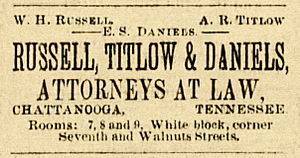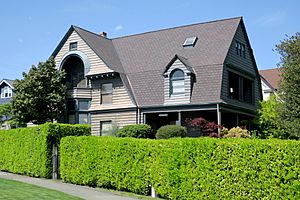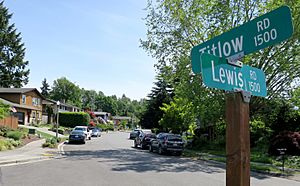Aaron Titlow facts for kids
Quick facts for kids
Aaron Rosser Titlow
|
|
|---|---|
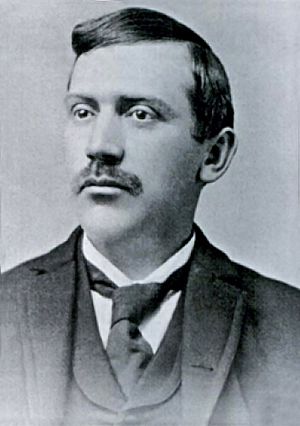 |
|
| Born | November 22, 1857 |
| Died | January 6, 1923 (aged 65) |
| Burial place | Tacoma Cemetery, Tacoma, Washington |
| Alma mater | Washington University in St. Louis |
| Years active | 1886–1922 |
| Known for | Political influence among Washington state democrats; Titlow Beach |
| Title | Democratic National Committeeman from the state of Washington |
| Term | 1920–1923 |
| Predecessor | Hugh C. Wallace |
| Successor | George Francis Christensen |
| Political party | Republican until 1896, then Democrat |
| Spouse(s) | Stella (Smart) Titlow |
| Children | 6 (5 survived) |
Aaron Rosser Titlow (born November 22, 1857 – died January 6, 1923) was an important lawyer and politician in Washington state. He worked as a prosecuting attorney for Pierce County from 1896 to 1898. He also represented Washington state on the Democratic National Committee from 1920 to 1923. Today, many people remember him because of Titlow Beach. This is a popular public park in Tacoma, Washington. It covers about 75-acre (30 ha) of waterfront land. His family sold the land to Metro Parks Tacoma in 1928.
Titlow moved to Tacoma, Washington in 1888. He became very successful by investing in real estate. As a lawyer, he took on big cases. He often defended the public against large companies. For example, in 1893, he won a case against the Tacoma City Council and a water company. This saved a lot of public money. In 1909, he also fought against a railroad company. He protected public access to the Tacoma waterfront. This also helped his own property interests.
Even though Titlow only held one public office (as prosecuting attorney), he was a very influential politician. He helped manage campaigns for other politicians. He also supported James M. Cox in the 1920 presidential election. Today, Titlow's old home in Tacoma and parts of his Hesperides Hotel are historic landmarks.
Contents
Early Life and Education
Aaron Titlow was born on a farm near Dayton, Ohio on November 22, 1857. His family had Dutch roots. When he was two, his parents, Aaron and Jane Titlow, moved to Delphi, Indiana. They hoped to find better farming land there. Titlow grew up on their farm. He went to public school in Delphi. He had four sisters: Alice, Mead, Read, and Lora.
From a young age, Titlow wanted to be a lawyer. He studied law books like Commentaries on the Laws of England by William Blackstone. Later, he joined the law school at Washington University in St. Louis. He finished his studies a year early, graduating in 1885.
Starting His Law Career
After law school, Titlow went back to Delphi and became a lawyer. But he wanted more opportunities. In 1886, he borrowed $60 and moved to Chattanooga, Tennessee. People there welcomed him. He first worked at a small law firm called Titlow and Walker. A year later, he joined two experienced lawyers. They formed a new firm: Russel, Titlow, and Daniels. This firm focused on business law. Titlow started to specialize in real estate cases.
Even though he made friends in Chattanooga, Titlow decided to move again. He was looking for even better chances for his career. In 1888, he moved to Tacoma, Washington. This was just before Washington became a state.
Life and Work in Tacoma
Becoming a Lawyer and Investor
Titlow arrived in Tacoma in 1888. He started a law firm called Titlow & Applegate. He also invested all the money he had saved in Tennessee into Tacoma real estate. This was a very smart move. It helped him become rich and well-known. He owned land not only in Tacoma but also in Gig Harbor and on Fox Island. By 1903, he owned three farms and about 300 lots near Tacoma.
Important Court Cases
In 1893, the Tacoma City Council wanted to buy the Tacoma Light and Water Company. They planned to pay $1,750,000. But the company's actual value was much less, under $600,000. People suspected that the company had paid money to get the City Council to agree. Titlow thought this purchase was not good for the public. On April 7, 1893, he publicly debated a councilman about it.
When he couldn't convince the council, Titlow took the case to court. He and John A. Shackleford won the case. They saved the city $787,000. This case made Titlow known as someone who couldn't be influenced by big companies.
In 1909, Titlow had another big legal fight. This time, it was with the Northern Pacific Railroad. The railroad wanted to control access to the Tacoma waterfront. This was led by James J. Hill, a powerful railroad owner. Titlow argued that he was fighting for public access. He also had his own reasons. The railroad's plans would have affected the ferry service between Tacoma and Fox Island. Titlow owned a lot of land on Fox Island. In the end, the railroad gave up its plans.
His Political Journey
Titlow was a Republican until 1896. Then, he switched to the Democratic Party. He said he was unhappy with how the Republicans handled money issues. That same year, he was elected as a prosecuting attorney for Pierce County. He served until 1898. This was the only public office he ever held.
Even without holding many offices, Titlow became a very active politician. He gained influence through his roles within the Democratic party. In 1897, he helped George Turner win his campaign for the U.S. Senate.
Later, Titlow became a close friend of Hugh C. Wallace. He took over Wallace's role as the Washington state Democratic National Committeeman on May 19, 1920. In this role, Titlow helped change the party's plans to benefit Tacoma. He made sure that naval ships would be divided equally between the Atlantic and Pacific fleets. This helped ports like Tacoma and Seattle.
Titlow was a strong supporter of William Jennings Bryan, a famous Democrat. He also supported James M. Cox for president in 1920. Titlow believed Cox would win the election and carry Washington state. After Cox lost, Titlow wanted the party chairman to resign. But he later changed his mind.
Working in Hospitality
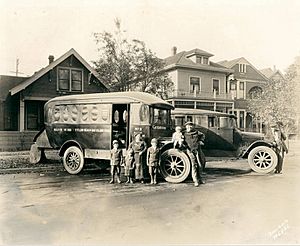
In 1911, Titlow built the Hesperides Hotel. It was designed by a famous Tacoma architect, Frederick Heath. The hotel cost $50,000 and had 30 guest rooms. It was built on the 75-acre (30 ha) waterfront property that Titlow bought in 1903. This area is now known as Titlow Park. This property was very important to Titlow. It was where the ferry connected Tacoma to Gig Harbor and Fox Island. These were places where Titlow owned a lot of other land. In 1909, he even went to court to protect this waterfront access and ferry service.
Building the hotel was a dream for Titlow. He and his family ran the hotel. His son, Marcus, worked there as a bellboy. Food for the hotel came from one of Titlow's farms.
The hotel offered many fancy features for its time. It had bathrooms with hot water, a barber shop, and pool tables. Guests could use different boats to explore Puget Sound, including a glass-bottom boat. It also had the first public saltwater pool in the Tacoma area. Even though Titlow couldn't get a liquor license for the hotel, it became a very popular resort. Wealthy people often stayed in the rooms. Other people, including the middle class, visited the hotel's amenities. They came by car or on a special bus service. The hotel's location at the ferry terminal made it even more popular.
Family Life and Passing
On April 26, 1893, Titlow married Stella Smart. She was from his hometown of Dayton. By 1903, they had three daughters: Ione, Constance, and Marcelle. Their son, Aaron Rosser Jr., died as a baby. Later, they had two more children: Lucile and Marcus.
In Tacoma, the family lived in a beautiful Colonial Revival-style house. It was custom-built for Titlow in 1899. Titlow was an active member of the Phi Delta Phi society. He also attended the Episcopal Church.
Titlow passed away on January 6, 1923, after a long illness. His wife and five children survived him.
His Lasting Impact
After Titlow's death in 1923, George Francis Christensen took over his role as the Democratic National Committeeman. Soon after, Titlow's house was bought by a contractor. It was then changed into a building with multiple apartments. Today, the house is part of Tacoma's historic Wedge District. It is also a stop on the city's historic tour.
The City of Tacoma named a road after him: South Titlow Road. But in Tacoma, Titlow is best known for Titlow Beach. In 1928, five years after he died, his family sold the Titlow Beach property and the Hesperides Hotel to Metro Parks Tacoma. It was then turned into a public park. During the Great Depression, there were plans to tear down the hotel. But the local community protested, and it was saved. In 1938, the hotel was renovated. Its upper floors were removed, and it became a community center. It is now called Titlow Lodge. In 2018, Titlow Lodge was named a Tacoma Historic Landmark.
After the Tacoma Narrows Bridge was built, the ferries to Gig Harbor and Fox Island were no longer needed. In 1958, the saltwater pool at the park was changed into a freshwater pool. It is still used today. As of 2020, Titlow Beach is still a popular place for people to visit all year round. Titlow Lodge is used for weddings and other community events. The park also has three miles of trails that are part of Tacoma Urban Trails. In September 2015, some of Aaron Titlow's family members gathered at Titlow Beach.
Images for kids
 | John T. Biggers |
 | Thomas Blackshear |
 | Mark Bradford |
 | Beverly Buchanan |


